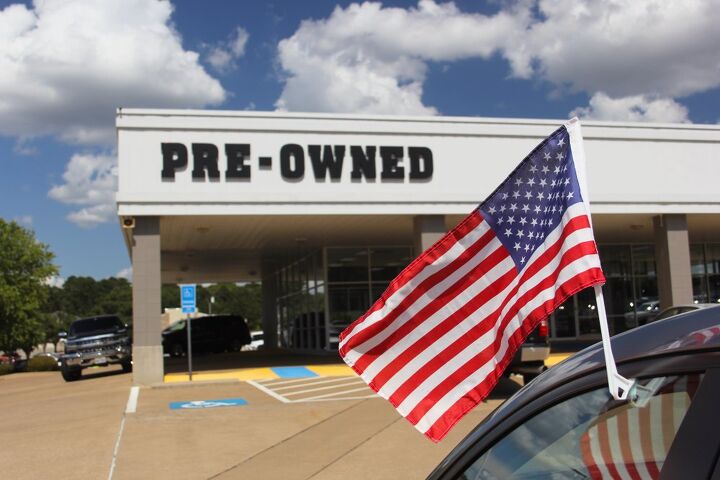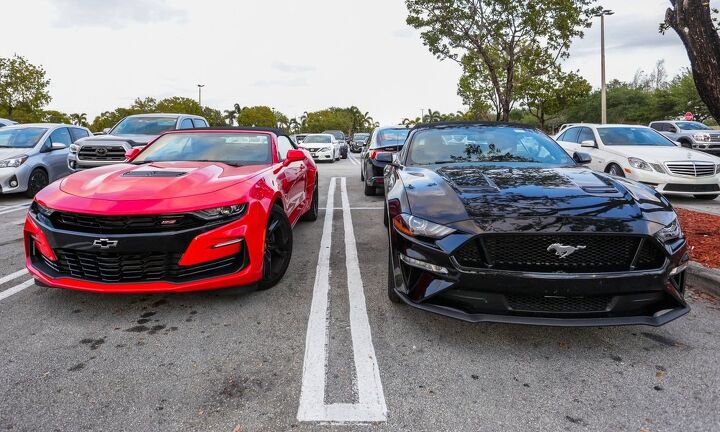#Economy
AutoNation Cutting Roughly 3,500 Jobs
After furloughing staff in response to the coronavirus pandemic, AutoNation has gradually allowed employees to return back to work. Half of the 7,000 people asked to take it easy in April won’t be coming back at all, however.
The automotive retailer has decided to permanently cut 3,500 jobs so it can focus on its bottom line and what it has unsettlingly called “the new normal” — a term frequently used to rationalize unsavory actions taken during the health crisis.
With customers unable to leave their homes to purchase cars, it’s to be expected that America’s largest automotive retailer would need to engage in some light restructuring. It also happens to have the best excuse imaginable for nuking a large portion of its workforce. Back in April, when the AutoNation was furloughing employees, it received nearly $95 million in federal small-business funds via the Payment Protection Program (PPP). A subset of anonymous staff members were said to have leaked the details to the media after deciding the firm was taking cash allocated for smaller outfits.
Outrage ensued and the company sheepishly returned the money.
Don't Bet on Seeing Chinese Brands in the U.S. Anytime Soon
Over the past decade, regular reports that Chinese automakers were readying a major push into the North American market became commonplace. We started seeing them move out of trade show basements to take up some of the most desirable real estate on the main floor. While some of the product clearly wasn’t yet up to snuff, one could imagine budget-focused products flooding the U.S. and Canada after a few years of polish. However, the last time that seemed like a likely scenario was 2018.
Chinese brands are still trying to break into the untapped North American market; some even have physical office space set up within the United States. However, Sino-American relations have soured dramatically over the past few years, and new financial hurdles have made wrangling a new market extremely difficult.
Elon Musk Selling Earthly Possessions, Gets Yelled at Online
Tesla CEO Elon Musk has had an interesting few days. It all kicked off when he went off on the politics behind coronavirus lockdowns — suggesting that state mandates had surpassed what should be deemed reasonable and that civil liberties were being infringed upon — during Wednesday’s earnings call. By week’s end, he was using social media to announce Tesla’s stock price was too high.
Despite it not being his first time making such a claim, and with the automaker turning a surprise first-quarter profit, the company’s share price still lost 10 percent in a single day. Musk then announced he would sell practically everything he owned. Initially, it seemed to be another partial joke taken completely literally by some followers and the media. But Musk began making good on the claim, listing two properties over the weekend.
Locked-down State Opens up Online Auto Sales, Nudging Industry in Direction of Recovery
Don’t expect the Present Year to come close to the sales tallies racked up in 2018 or the year before. No analyst foresees such a scenario; globally, LMC sees auto production taking a 20-percent haircut in 2020.
But the return to normality is underway in the U.S., aided by the federal government’s reopening plan (a set of guidelines to be acted on by individual states), but especially by the realization of governors that car buyers need some way to bring a vehicle home. Michigan, via an executive order, greenlit online sales on April 9th. Now it’s Pennsylvania’s turn.
Auto Sales Officially Considered 'Essential Service' by U.S. Government
Updated social distancing guidance released by the Department of Homeland Security’s Cybersecurity and Infrastructure Security Agency (CISA) on Friday indicates the automotive industry is now an essential business.
Version 3.0 (for those keeping count) of what constitutes “essential critical infrastructure workers” added a number of job descriptions as the federal government mulls how to restart the U.S. economy. Among them is pretty much every job related to automotive manufacturing and sales.
Easier Said Than Done: Restarting the Automotive Industry
As the global health crisis pivots toward becoming an economic one, the automotive industry is understandably eager to know when it can begin producing cars again. The situation isn’t going to be as easy as throwing open a few breaker boxes and giving the thumbs up. A mile-long list of problems, many of which lack easy answers, will first have to be tackled before things return to normal.
Supply chains will be slow to move — and potentially severed — as other nations wait longer to walk back social distancing measures. Not all factories will resume operation at the same time, and not all parts suppliers or shipping agencies will have made it through the coronavirus pandemic intact. It’s also uncertain how quickly customers will return to the market. In tougher financial times, customers may remain hesitant in making large purchases; meanwhile, localized quarantines will undoubtedly continue suppressing sales in certain markets. Then we have the elephant in the room — the vast amount of money this colossal reboot is going to require.
Have You Heard About the Coronavirus Being Bad for the Economy Yet?
As we attempt to wean ourselves off endless discussions the new coronavirus, we’ve noticed there’s not exactly a glut of alternative news out there. Trade shows are being delayed, factories are being idled, and the whole world seems to be in standby mode as we attempt to stall the spread of COVID-19 following its migration out of China.
Regional quarantines in Asia were already doing a number on supply chains, and it wasn’t long before manufacturers around the world began idling production to further slow the virus’s spread. By the beginning of March, it was becoming quite clear that auto sales would suffer significant impacts as people spent the next several weeks isolated in their own homes. Now, the push is on to assess just how much this whole ordeal will impact an OEM’s bottom line.
Ram Sets Price for 2020 EcoDiesel Pickups
Fresh off giving Chevy a good drubbing in the American sales race, Ram has announced pricing for its new batch of EcoDiesel half-ton pickup trucks.
We’ll save you a click and tell you above the fold that the cheapest way to get into a new Ram EcoDiesel is by way of two-wheel drive Tradesman wearing Quad Cab clothes. That truck stickers for $36,890 plus destination. There’s more to it than that, of course, so you’ll want to hit the jump to learn why Ram feels the need to offer not one but two different EcoDiesels in their showrooms at the same time.
QOTD: Thinking Small Again?
If the global economy were weather, yesterday brought dark clouds, an unsettling calm, and that weird ozone smell that heralds a violent storm. The bond market is waving its hands and flashing a warning sign. Spooked traders waded through a sea of red as Wall Street and other foreign exchanges began resembling the elevator scene in The Shining.
It’s quite possible all those warnings issued by major automakers of a looming recession weren’t made out of an abundance of caution, but something a little more concrete. No wonder the likes of Ford and General Motors find themselves in the midst of “downturn planning.”
As you read yesterday, one possible consequence of another economic meltdown is a return of smaller, more affordable vehicles — products both Ford, GM, and Fiat Chrysler spent the last few years dropping from their lineups. While the entirety of these small vehicles wouldn’t return in such a scenario, some might. Which cars deserve a green light?
Ford and GM Prep for Economic Hardship
With another global recession looming on the horizon, executives at General Motors and Ford are busy touting the merits of being prepared. On Tuesday, the financial heads of both automakers were present at a J.P. Morgan Conference in New York to explain the steps being taking to mitigate economic disaster.
While financial hardship is not yet a guarantee for the United States, the ongoing trade war with China has impacted the cost of doing global business. Likewise, most sizable automotive markets are either underperforming or have surpassed peak growth levels. Depending upon the severity of the anticipated recession, GM claims its “downturn planning” could include postponing non-essential capital expenditures and shifting toward lower-priced automobiles.
Rare Rides: The Ultimate 8 Series BMW Is the Alpina B12 of 1992
Rare Rides featured an Alpina once before: the performance tuner’s take on the late-Eighties 6 Series — the B7. Today’s Alpina is a B12, which is literally five more. And more is better, right?
Attention, Plebs: New Cars Are Becoming Prohibitively Expensive
As new vehicle prices continue to climb, many wonder how high MSRPs can go before the public decides to take a pass — assuming they haven’t already. Sales growth is slowing, even in seemingly bulletproof markets like China. Even before this ominous backdrop unfurled, dealers were making noise about new car prices that had grown overly ambitious, claiming they couldn’t endure another period of sustained economic hardship.
Edmunds estimates that the average transaction price of a new vehicles reached $36,495 in December 2018 — a 3 percent increase compared to December of 2016 and a 13 percent increase compared to December of 2012. Taking that knowledge, Road & Track compiled a broader picture of the new-car market and where it might be going.
Spoilers ahead if you don’t want the unpleasant non-surprise ruined.
QOTD: Pointing Fingers at General Motors?
By a wide margin, the most important automotive-related news this week has been General Motors’ impending closure of five manufacturing facilities across North America. Accompanying the closures are losses of thousands of jobs and the discontinuation of six passenger car models over the next year or so.
Who’s to blame here?
How Do Automakers Plan to Cope With Their Upcoming Nightmare?
On Wednesday, we reported General Motors’ plan to buy out salaried employees as part of a long-term cost-cutting strategy, with further reductions in headcount looking likely. Despite its healthy profits, GM knows industry forecasters predict a period of economic hardship and continuously dwindling car sales. OEMs need as much money as they can cling to in order to weather the costs associated with advancing their collective shift into electrification and autonomous vehicles, while at the same time preparing for a global trade war.
A bad moon is rising and every manufacturer needs a way to cope.
Report Claims Self-driving Cars Will Make So Much Money, No One Will Care About Employment Losses
There’s been plenty of discussion about how autonomous vehicles will effectively annihilate the trucking and taxi industries. We’ve certainly discussed it — in addition to concerns that self-driving vehicles may not reduce pollution and traffic congestion as promised.
Fear not, claims a recent report sponsored by Securing America’s Future Energy. The problem of self-driving cars displacing huge numbers workers is apparently overblown when compared to the economic impact as a whole. According to the study — “America’s Workforce and the Self-Driving Future” — the loss in employment opportunities should be offset by the potential advantages in safety, cheaper transportation, mobility, air quality, and individual productivity.
The report says that by 2050, AVs will contribute between $3 and $6 trillion in cumulative consumer and societal benefits to the U.S. economy. While it’s not clear how much of that will go into the pockets of people who’ve lost their jobs, it sure sounds great in theory.
But is this really the future of autonomous transportation? And who are these wizards of analysis who tell us the future looks so damn bright?





























Recent Comments